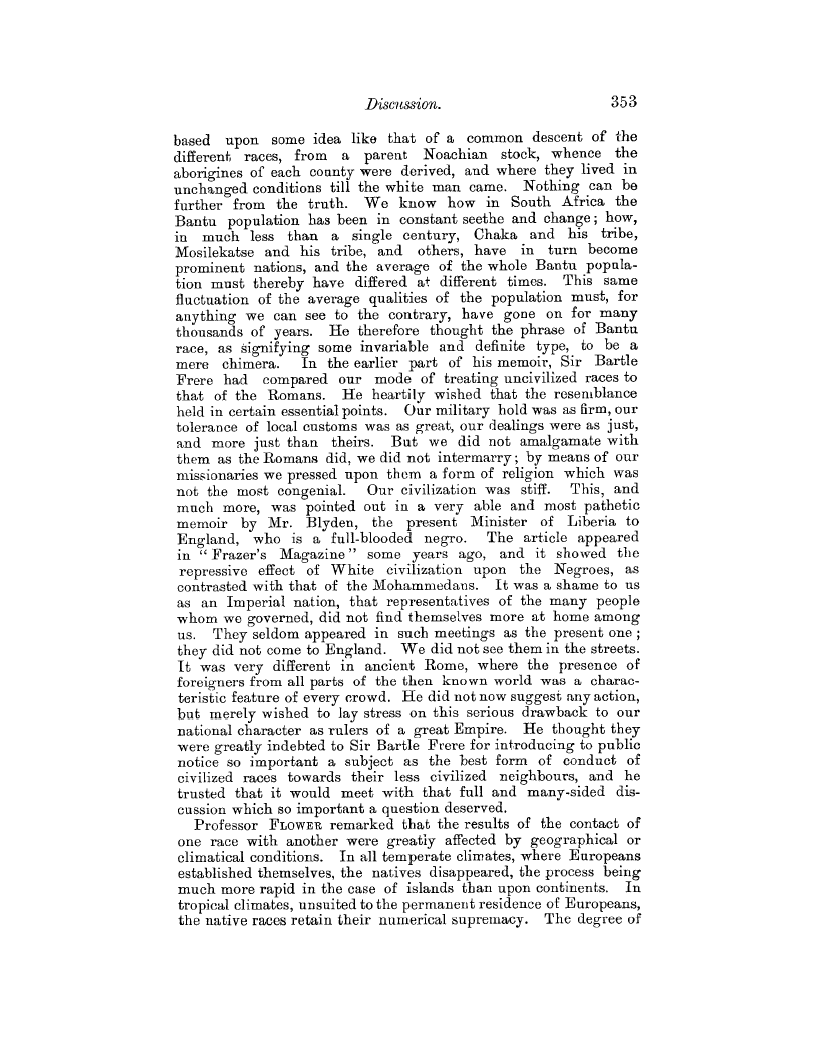OCR Rendition - approximateDiscussion. 353
based upon some idea like that of a common descent of the different races, from a parent Noachian stock, whence the aborigines of each county were derived, and where they lived in
unchanged conditions till the white man came. Nothing can be further from the truth. We know how in South Africa the Bantu population has been in constant seethe and change ; how, in much less than a single century, Chaka and his tribe, Mosilekatse and his tribe, and others, have in turn become prominent nations, and the average of the whole Bantu population must thereby have differed at different times. This same fluctuation of the average qualities of the population must, for anything we can see to the contrary, have gone on for many thousands of years. He therefore thought the phrase of Bantu race, as signifying some invariable and definite type, to be a mere chimera. In the earlier part of his memoir, Sir Bartle Frere had compared our mode of treating uncivilized races to that of the Romans. He heartily wished that the resemblance held in certain essential points. Our military hold was as firm, our tolerance of local customs was as great, our dealings were as just, and more just than theirs. But we did not amalgamate with them as the Romans did, we did not intermarry ; by means of our missionaries we pressed upon them a form of religion which was not the most congenial. Our civilization was stiff. This, and
much more, was pointed out in a very able and most pathetic memoir by Mr. Blyden, the present Minister of Liberia to England, who is a full-blooded negro. The article appeared in " Frazer's Magazine " some years ago, and it showed the repressive effect of White civilization upon the Negroes, as contrasted with that of the Mohammedans. It was a shame to us as an Imperial nation, that representatives of the many people whom we governed, did not find themselves more at home among us. They seldom appeared in such meetings as the present one ; they did not come to England. We did not see them in the streets.
It was very different in ancient Rome, where the presence of foreigners from all parts of the then known world was a characteristic feature of every crowd. He did not now suggest any action, but merely wished to lay stress on this serious drawback to our national character as rulers of a great Empire. He thought they were greatly indebted to Sir Bartle Frere for introducing to public notice so important a subject as the best form of conduct of civilized races towards their less civilized neighbours, and he trusted that it would meet with that full and many-sided discussion which so important a question deserved.
Professor FLOWER remarked that the results of the contact of one race with another were greatly affected by geographical or climatical conditions. In all temperate climates, where Europeans established themselves, the natives disappeared, the process being much more rapid in the case of islands than upon continents. In tropical climates, unsuited to the permanent residence of Europeans, the native races retain their numerical supremacy. The degree of
|

